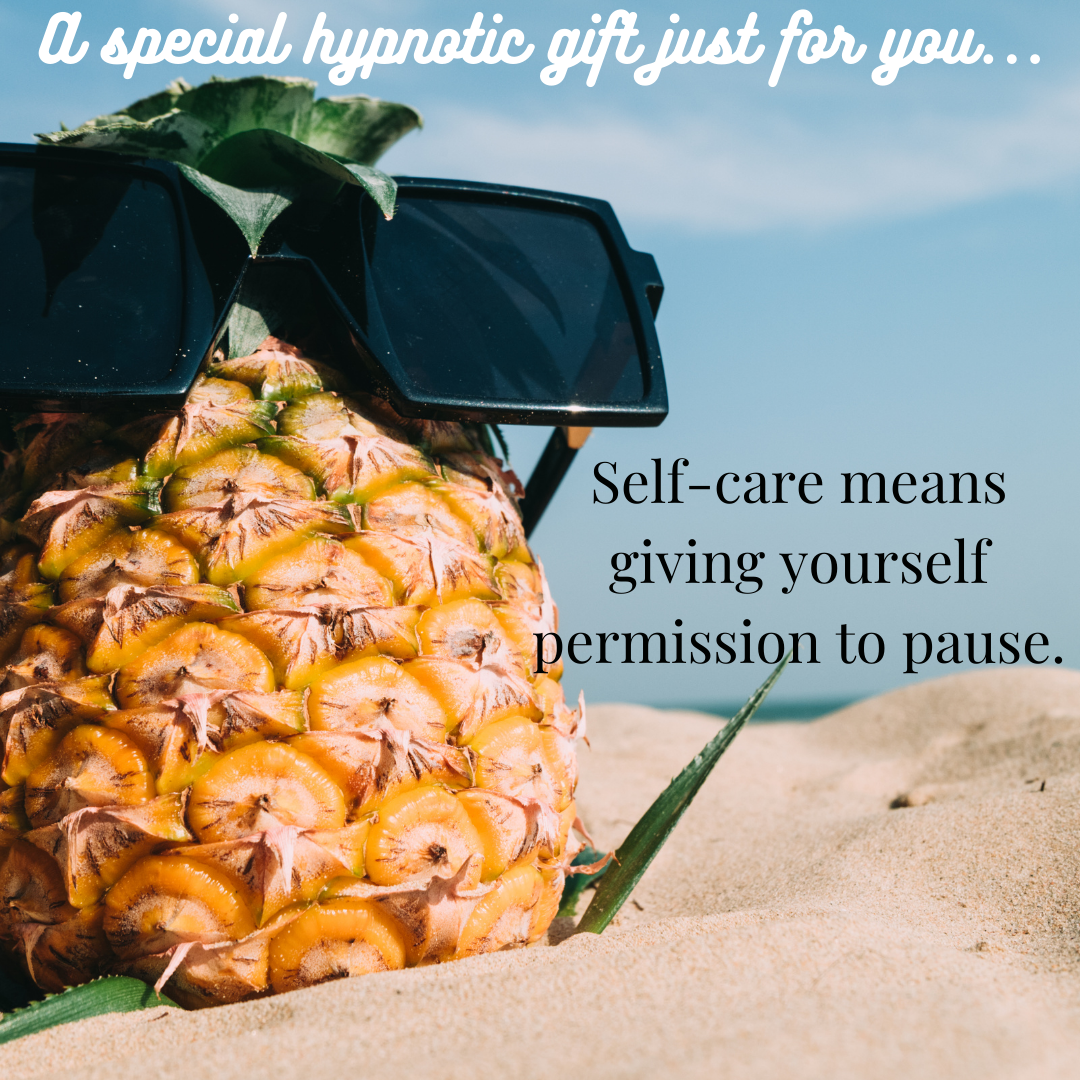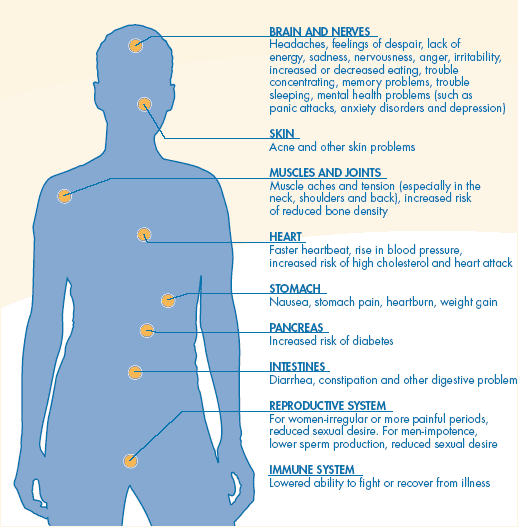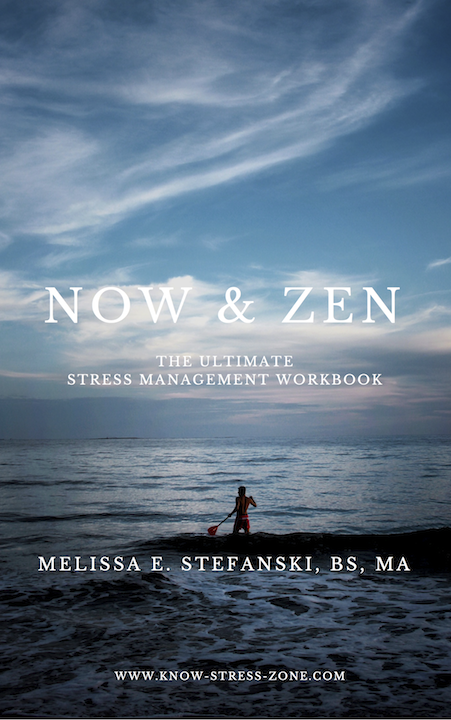What Is Stress and What Causes It?
What is stress and what causes it? I think it's important to learn as much as possible about stress. I know that sounds counterproductive when we're trying to manage stress, but it's important to understand what we're dealing with. After all, stress comes from a perception of an event, person, feeling, etc. being out of our control. So, what better way to regain that sense of control than to learn more about stress.
|
According to helpguide.org: "Stress is a normal physical response to events that make you feel threatened or upset your balance in some way. When you sense danger—whether it’s real or imagined—the body's defenses kick into high gear in a rapid, automatic process known as the “fight-or-flight-or-freeze” reaction, or the stress response. |
In emergency situations, stress can save your life—giving you extra strength to defend yourself, for example, or spurring you to slam on the brakes to avoid an accident.
The stress response also helps you rise to meet challenges. Stress is what keeps you on your toes during a presentation at work, sharpens your concentration when you’re attempting the game-winning free throw, or drives you to study for an exam when you'd rather be watching TV.
But beyond a certain point, stress stops being helpful and starts causing major damage to your health, your mood, your productivity, your relationships, and your quality of life."
What Is Stress and What Causes It?
Some Basics
We all need some stress in our lives in order to survive. For instance, most of us feel some level of stress when it comes to paying our bills. This stress motivates us to work so that we can earn a wage, which affords us the money to buy food. Our bodies also respond to stress to alert our attention. When the alarm clock goes off, we get a "ping" of stress in our bodies. That's a good thing. We want to experience some stress in order to get us out of bed.
There are some things in life that merit some stress. If you're driving and a car swerves in front of you, you really want your body to feel some stress so that you respond to what's happening. Where stress starts to become harmful is when it's not alerting our attention to anything helpful. When the feeling of being stressed takes over the usefulness of stress, that's when we get into trouble.
Helpguide.org
goes on to say, "Modern life is full of hassles, deadlines,
frustrations, and demands. For many people, stress is so commonplace
that it has become a way of life. Stress isn’t always bad. In small
doses, it can help you perform under pressure and motivate you to do
your best. But when you’re constantly running in emergency mode, your
mind and body pay the price. You can protect yourself by recognizing the
signs and symptoms of stress and taking steps to reduce its harmful
effects."
What Is Stress and What Causes It?
The Body's Stress Response
When you perceive a threat, your nervous system responds by releasing a flood of stress hormones, including adrenaline and cortisol. These hormones rouse the body for emergency action.
Your heart pounds
faster, muscles tighten, blood pressure rises, breath quickens, and your
senses become sharper. These physical changes increase your strength
and stamina, speed your reaction time, and enhance your focus—preparing
you to either fight or flee from the danger at hand.
What Is Stress and What Causes it?
|
What Is Stress and what Causes It?
Stress Doesn't Always Look Stressful
|
Psychologist Connie Lillas uses a driving analogy to describe the three most common ways people respond when they’re overwhelmed by stress:
|
What Is Stress and What Causes It?
Signs & Symptoms of Stress Overload
Cognitive Symptoms
• Memory problems
• Inability to concentrate
• Poor judgment
• Seeing only the negative
• Anxious or racing thoughts
• Constant worrying
Emotional Symptoms
• Moodiness
• Irritability or short temper
• Agitation, inability to relax
• Feeling overwhelmed
• Sense of loneliness and isolation
• Depression or general unhappiness
Physical Symptoms
• Aches and pains
• Diarrhea or constipation
• Nausea, dizziness
• Chest pain, rapid heartbeat
• Loss of sex drive
• Frequent colds
Behavioral Symptoms
- Eating more or less
- Sleeping too much or too little
- Isolating yourself
- Procrastinating or neglecting responsibilities
- Using alcohol, cigarettes, or other drugs to relax
- Nervous habits (eg: nail biting, pacing, etc.)
Keep in mind that the signs and symptoms of stress can also be caused by other psychological or medical problems. If you’re experiencing any of the warning signs of stress, it’s important to see a doctor for a full evaluation. Your doctor can help you determine whether or not your symptoms are stress-related and help you figure out for you specifically the answer to "What is stress and what causes it?"
What Is Stress and What Causes It?
How Much Stress Is Too Much?
Because of the widespread damage stress can cause, it's important to know your own limit. But just how much stress is "too much" differs from person to person. We're all different. Some people are able to roll with the punches, while others seem to crumble in the face of far smaller obstacles or frustrations. Some people even seem to thrive on the excitement and challenge of a high-stress lifestyle.
Your
ability to tolerate stress depends on many factors, including the
quality of your relationships, your general outlook on life, your
emotional intelligence, and genetics.
What Is Stress and What Causes It?
Things That Influence Your Stress Tolerance Level
- Your support network – A strong network of supportive friends and family members can be an enormous buffer against life’s stressors. On the flip side, the more lonely and isolated you are, the greater your vulnerability to stress.
• Your sense of control – It may be easier to take stress in your stride if you have confidence in yourself and your ability to influence events and persevere through challenges. If you feel like things are out of your control, you’re likely to have less tolerance for stress.
• Your attitude and outlook
– Optimistic people are often more stress-hardy. They tend to embrace
challenges, have a strong sense of humor, and accept that change is a
part of life.
• Your ability to deal with your emotions –
You’re extremely vulnerable to stress if you don’t know how to calm and
soothe yourself when you’re feeling sad, angry, or overwhelmed by a
situation. The ability to bring your emotions into balance helps you
bounce back from adversity and is a skill that can be learned at any
age.
• Your knowledge and preparation – The more you
know about a stressful situation, including how long it will last and
what to expect, the easier it is to cope. For example, if you go into
surgery with a realistic picture of what to expect post-op, a painful
recovery will be less traumatic than if you were expecting to bounce
back immediately.
What Is Stress and What Causes It?
Causes of Stress
The situations and pressures that cause stress are known as stressors. We usually think of stressors as being negative, such as an exhausting work schedule or a rocky relationship.
However, anything that puts high demands on you or forces you to adjust can be stressful. This includes positive events such as getting married, buying a house, going to college, or receiving a promotion.
Of
course, not all stress is caused by external factors. Stress can also be
self-generated, for example, when you worry excessively about something
that may or may not happen, or have irrational, pessimistic thoughts
about life.
What is stress and what causes it depends, at
least in part, on your perception of it. Something that's stressful to
you may not faze someone else; they may even enjoy it. For example, your
morning commute may make you anxious and tense because you worry that
traffic will make you late. Others, however, may find the trip relaxing
because they allow more than enough time and enjoy listening to music
while they drive.
Common external causes of stress
• Major life changes
• Work or school
• Relationship difficulties
• Financial problems
• Being too busy
• Children and family
Common internal causes of stress
• Chronic worry
• Pessimism
• Negative self-talk
• Unrealistic expectations/Perfectionism
• Rigid thinking, lack of flexibility
• All-or-nothing attitude
What Is Stress and What Causes It?
What's Stressful for You?
What's stressful for you may be quite different from what's stressful
to someone else. "What is stress and what causes it?" has a different
answer for everybody.
For example:
Karen is terrified of getting up in front of people to perform or speak, while her best friend, Nina, lives for the spotlight.
Phil
thrives under pressure and performs best when he has a tight deadline,
while his co-worker, Matt, shuts down when work demands escalate.
Anita
enjoys helping her elderly parents. Her sister, Constance, helps out as
well but finds the demands of caretaking very stressful.
Richard
doesn’t hesitate to send food back or complain about bad service when
eating out, while his wife, Miranda, finds it much too stressful to
complain.
What Is Stress and What Causes It?
Effects of Chronic Stress
The body doesn’t distinguish between physical and psychological threats. When you’re stressed over a busy schedule, an argument with a friend, a traffic jam, or a mountain of bills, your body reacts just as strongly as if you were facing a life-or-death situation. If you have a lot of responsibilities and worries, your emergency stress response may be “on” most of the time. The more your body’s stress system is activated, the harder it is to shut off.
Long-term exposure to
stress can lead to serious health problems. Chronic stress disrupts
nearly every system in your body. It can raise blood pressure, suppress
the immune system, increase the risk of heart attack and stroke,
contribute to infertility, and speed up the aging process. Long-term
stress can even rewire the brain, leaving you more vulnerable to anxiety
and depression.
Many health problems are caused or exacerbated by stress, including:
• Pain of any kind
• Heart disease
• Digestive problems
• Sleep problems
• Depression
• Weight problems
• Autoimmune diseases
• Skin conditions, such as eczema
What Is Stress and What Causes It?
Dealing with Stress and Its Symptoms
While unchecked stress is undeniably damaging, you have more control over your stress levels than you might think. Unfortunately, many people cope with stress in ways that only compound the problem. You might drink too much to unwind at the end of a stressful day, fill up on comfort food, zone out in front of the TV or computer for hours, use pills to relax, or relieve stress by lashing out at other people. However, there are many healthier ways to cope with stress and its symptoms.
Since everyone has a unique response to stress,
there is no “one size fits all” solution to dealing with it or answering
the question, "What is stress and what causes it?" No single method
works for everyone or in every situation, so experiment with different
techniques and strategies. Focus on what makes you feel calm and in
control.
What Is Stress and What Causes It?
Learn How to Manage Stress
You may feel like the stress in your life is out of your control, but you can always control the way you respond. Managing stress is all about taking charge: taking charge of your thoughts, your emotions, your schedule, your environment, and the way you deal with problems. Stress management involves changing the stressful situation when you can, changing your reaction when you can’t, taking care of yourself, and making time for rest and relaxation.
Remember the four As: avoid, alter, adapt, or accept
• Avoid
unnecessary stress. Not all stress can be avoided, but by learning how
to say no, distinguishing between “shoulds” and “musts” on your to-do
list, and steering clear of people or situations that stress you out,
you can eliminate many daily stressors.
• Alter the
situation. If you can’t avoid a stressful situation, try to alter it. Be
more assertive and deal with problems head on. Instead of bottling up
your feelings and increasing your stress, respectfully let others know
about your concerns. Or be more willing to compromise and try meeting
others halfway on an issue.
• Adapt to the stressor.
When you can’t change the stressor, try changing yourself. Reframe
problems or focus on the positive things in your life. If a task at work
has you stressed, focus on the aspects of your job you do enjoy. And
always look at the big picture: is this really something worth getting
upset about?
• Accept the things you can’t change.
There will always be stressors in life that you can’t do anything about.
Learn to accept the inevitable rather than rail against a situation and
making it even more stressful. Look for the upside in a situation—even
the most stressful circumstances can be an opportunity for learning or
personal growth. Learn to accept that no one, including you, is ever
perfect.
You can also better cope with the symptoms of stress by strengthening your physical health
• Set aside Relaxation time.
Relaxation techniques such as yoga, meditation, and deep breathing
activate the body’s relaxation response, a state of restfulness that is
the opposite of the stress response.
• Exercise
regularly. Physical activity plays a key role in reducing and preventing
the effects of stress. Nothing beats aerobic exercise for releasing
pent-up stress and tension.
• Eat a healthy diet.
Well-nourished bodies are better prepared to cope with stress. Start
your day with a healthy breakfast, reduce your caffeine and sugar
intake, and cut back on alcohol and nicotine.
• Get plenty of sleep. Feeling tired can increase stress by causing you to think irrationally. Keep your cool by getting a good night’s sleep.
• Quick stress relief.
The best way to reduce stress quickly and reliably is by using your
senses—what you see, hear, smell, taste, and touch—or through movement.
By viewing a favorite photo, smelling a specific scent, listening to a
favorite piece of music, tasting a piece of gum, or hugging a pet, for
example, you can quickly relax and focus yourself. Of course, not
everyone responds to each sensory experience in the same way. Something
that relaxes one person may do nothing but irritate someone else. The
key is to experiment with your senses and discover the sensory
experiences that work best for you.
• Emotional connection.
Nothing contributes more to chronic stress than emotional disconnection
from ourselves and others. Understanding the influence emotions have on
your thoughts and actions is vital to managing stress. Life doesn’t
have to feel like a roller coaster ride with extreme ups and downs. Once
you’re aware of your emotions, even the painful ones you normally try
to avoid or bottle up, the easier it is to understand your own
motivations, stop saying or doing things you later regret, gain renewed
energy, and smooth out the ride.
I want to thank Helpguide.org for their eloquent answers for "What is stress and what causes it?"
What Is Stress and What Causes It?
Summing things up
|
So, what is stress and what causes it? This is a question deserving of your attention. Once you understand where stress is coming from, it tends to alleviate that feeling of "going crazy." You're not going crazy! You're a person experiencing LIFE with a capital "L." But, you can manage stress better. If you need help, please sign up for your free stress management course to get moving in the right direction. |





